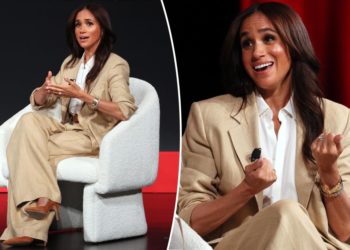Barry Benepe, an urban planner who in 1976 conceived of inviting farmers to truck their ripe tomatoes, peppery arugula and fresh corn to forlorn patches of New York City, delivering bustling markets and excitement to the city along with flavorful and healthy food, died on Wednesday at his home in Saugerties, N.Y., in the Hudson Valley. He was 96.
His son Adrian Benepe, a former parks commissioner of New York City, announced the death.
New York’s popular Greenmarkets, the largest farmers’ market network in the country, helped start a national farm-to-table culinary movement. They are credited with saving thousands of acres of farmland in the region from development and reviving urban neighborhoods. Renowned chefs who discovered the bounties of fresh strawberries and zucchini blossoms were soon buying much of their seasonal produce from Greenmarket stalls.
Mr. Benepe (pronounced BEN-eh-pea) raised grant money and worked the city bureaucracy to organize the first market with a colleague, Robert A. Lewis, whose role was to recruit wary farmers. During a decade of high crime and urban decay in New York, farmers feared that whatever money they made would be boosted before they escaped the city.
Instead, the first Greenmarket — which kicked off in Manhattan in the summer of 1976 at East 59th Street and Second Avenue with a handful of upstate growers offering an open-air cornucopia — was an immediate success.
“It could not have been a better location,” between two popular department stores, Mr. Benepe recalled in a 2022 interview with On Hand, a foodie newsletter. “We were halfway between Bloomingdale’s and Alexander’s. We were in the passage between the two, so you had to stop.”
By contrast, the Union Square market — today the rock star of Greenmarkets — did not have a promising start. It opened later that year, but for weeks nobody came to visit the farmers who had set up in a park strewn with litter and known for drug sales. Mr. Benepe personally watered crab apple trees on the site.
The market went on to anchor a neighborhood rebirth that included Danny Meyer’s Union Square Café and a multiyear improvement scheme by the parks department.
“We both loved the idea of the city benefiting from the revival of a European kind of lifestyle,” Mr. Lewis, whom Mr. Benepe hired in 1975 for his one-man planning firm, said in an interview. “He’d spent so much time in France and England. The daily shopping at the market. The fresh bread — this is Barry, a romantic.”
Mr. Benepe’s work uniform of T-shirt, baggy pants and sandals suggested an aging hippie. In manner, he was exceedingly polite, but looks and speech hid a tenacity that wore down businesses, neighbors and community board members who were wary that open-air markets would disturb the peace or undercut local grocery stores.
Mr. Benepe was rebuffed by City Hall when he suggested that it run the markets. Instead, he wangled a small philanthropic grant from the J.M. Kaplan Fund and enlisted Marian Sulzberger Heiskell, founder of the Council on the Environment of New York City (now GrowNYC), a nonprofit group, to sponsor the markets.
He understood publicity and was often in the public eye. “Some people are a little resentful because they do the work and he gets the credit,” Evelyn Strouse, chairwoman of the Union Square Community Coalition, told The New York Times in 1993.
Mr. Benepe presided as director of Greenmarket for 22 years, stepping down in 1998 when the program had expanded to 20 markets — from City Hall to Harlem and from the Grand Concourse in the Bronx to Grand Army Plaza in Brooklyn. (There are now more than 45 markets spread across the five boroughs.)
“Manhattan simply has the best farmers’ market in the United States,” The Times declared in 2001.
Barry Allen Benepe was born on May 21, 1928, in Manhattan, the younger of two sons of Robert S. Benepe, who ran a linen import business, and Marjorie (Berry) Benepe, a fashion illustrator. He grew up between the family’s apartment on Gramercy Square and a 200-acre farm in Maryland that his father bought. It was there that Barry’s interest in the economics of farm produce arose when he drove tomatoes to a cannery that he said price-gouged growers.
He attended Saint Andrew’s Episcopal School in Maryland and graduated from Williams College in Massachusetts with a bachelor’s degree in fine arts in 1950. (A classmate was Stephen Sondheim, and when Mr. Sondheim staged his first musical revue, as an undergraduate, Mr. Benepe designed the set.)
After studying art at the Cooper Union in New York, he went on to earn a B.A. in architecture from the Massachusetts Institute of Technology.
But community planning interested him more than designing buildings. Mr. Benepe worked as the chief planner for Newburgh, N.Y., then landed a job with a planning firm in Manhattan. When his mentor there died, Mr. Benepe took over the office space for his own practice.
He was animated by the idea of making cities more hospitable to people. In 1966, he helped organize a protest to close Central Park to automobile traffic on Sundays in the summer. Sixty bicyclists blocked cars from the park’s circular drive in a caravan led by a horse-drawn carriage (with the future mayor Edward I. Koch as a passenger).
The protest led Mr. Benepe and others to found the advocacy group Transportation Alternatives. Fifty-two years after that first protest, which was followed by others, the city banned private cars from the park entirely in 2018. Mr. Benepe was there to celebrate.
In reviving city farmers’ markets, he and his younger partner, Mr. Lewis, were inspired by the sidewalk markets of Paris as well as ones in New York City that had withered in the 1930s with the advent of long-haul refrigerated trucks and supermarkets.
“I always said that if all the supermarkets in New York would carry local produce, they could put the Greenmarket out of business,” Mr. Benepe told the magazine Good in 2010. “That would be fine. The supermarkets could buy from farmers, but they don’t.”
Mr. Benepe was married three times. His marriage to Jagna Wojcicki, whom he had met at an antiwar picnic, ended in divorce in 1963. A second marriage, to Morag Clyne, ended in divorce in 1974. In 1988, he married Judith Spektor, whose career in public service included working in the mayor’s office under Mr. Koch. She survives him.
In addition to his wife and his son Adrian, from his first marriage, he survived by a daughter, Jennifer Benepe, also from his first marriage; three other sons, Andrew, Callum and Simon, from his second marriage; five grandchildren; and one great-grandson.
“My father was never a traditional father,” Adrian Benepe, who was the city parks commissioner from 2002 to 2012 under Mayor Michael R. Bloomberg, said in an interview. “He didn’t take me to Central Park to throw a baseball. He took me to the park to show me what failing infrastructure looked like, and how the light plays across the sandstone of the historic bridges. He was opening my eyes to architecture and design and planning.”
After he retired from Greenmarket and began spending half the year at his country place in Saugerties, Mr. Benepe and his wife, Ms. Spektor, helped start a local farmer’s market in that picturesque community. Its appeal was the same as the original Manhattan markets: “Take home freshly harvested food grown, picked and brought to market by local farmers,” its website promises. It is still going strong.
Trip Gabriel is a Times reporter on the Obituaries desk.
The post Barry Benepe, Who Gave New York Its Greenmarkets, Dies at 96 appeared first on New York Times.




